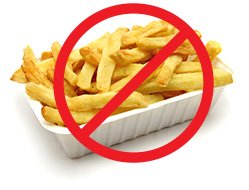In an age of excess, clever marketing, and constant access to food, overeating is almost inevitable. Everywhere we look loom fast-food joints, billboards, or commercials telling us to eat, eat, eat! There's no doubt eating a Five Guys hamburger is a joyful experience, but consistent stops at burger joints and candy aisles only serve to make our waists fatter and our wallets thinner. In short, it's in your best interest to take it down a notch or two.
Realizing you have an attraction to unhealthy food is the first and most important step in solving a tough equation. If you're unhappy with how you look and feel, identifying unhealthy lifestyle choices is the first step toward better health. Recognizing what needs to change is no easy task—trust me, I've been there. My self-image caught hold of me after years of excessive drinking and double-fisting cheap-ass, greasy pizza. One day I looked in the mirror at my growing belly and knew something had to be done.

You don't need to cut out everything you love. You won't have much success if you think you can go from fast food lover to ultra-clean eater in one day. It's just like working out: You don't change from couch potato to workout machine with the flip of a switch. You have to work at it and make little changes as you go along.
I'm no scientist, nor do I have a degree in psychology, but I have been trapped in fast food's evil clutches and managed to escape unscathed. I developed these steps so you don't have to go through the same difficulties I did!
Step 1: Make Simple Adjustments
Like I said before, you can't jump into this change with guns blazing. If you do, you'll probably feel overwhelmed, deprived, and be more likely to closet-eat. Instead of completely cleaning out your fridge, try making small changes.

For example: use only half the bun on a hamburger, order your chicken grilled instead of fried, and order a side salad instead of fries.
Once you master making smarter choices at restaurants, try bringing a healthy lunch to work at least three times per week. Once you adjust to that, bring your lunch every day, or make a healthy dinner or breakfast once per week. The point is to take small steps and allow yourself time to make lasting changes.
Finding a routine and plan that works might take some time, but you'll be much better off in the long run.
Step 2: Beat the Emotional Eater
Who hasn't fallen into the "I need a beer and a burger" predicament? Sometimes it feels like the only way to lift the weight of the world from your shoulders is boozing or munching. Giving in to emotional eating can take a toll on your body. The best way to beat it is to find an alternative outlet.
Test out new ways to cope with emotional distress that don't involve eating. My favorite mechanism is exercise. Studies have found exercise releases endorphins. I feel much better after I work out. So if you struggle with stress, heartache, or anxiety, try training—it can have a huge impact on your mood.
Step 3: Ignore Outside Influences
You can be influenced by friends, co-workers, commercials, print ads, and billboards. When I found fitness, those external influences were the most difficult things for me to manage. Every day, my coworkers went out to eat together at fast food or casual restaurants. I had to remove myself from the situation and begin to bring my own food. Although they teased me, I knew they had respect for what I was doing. I became the influencer.

Hearken back to those D.A.R.E. days and learn to "just say no." Take it upon yourself to take a stand. Act like you know something they don't, and be a trendsetter. You might look or feel like an outcast now, but you'll have the upper hand when you're not huffing and puffing when you take the stairs up to the office.
Step 4: Read Food Labels
If you're not in the habit of reading food labels, "fat-free" might look like a wise choice. Don't be fooled. "Fat-free" usually means "full of sugar." It's important to decode those buzzwords by reading the nutrition facts and the ingredient list.
Pay special attention to the trans fat, sodium, and sugar content. That bag of fat-free granola might have more sugar in it than you need in an entire week. Trying to un-puzzle the enigma of "healthy" is the most difficult part of eating right.

Here are a couple easy rules:
- If it sounds too good to be true, it probably is.
- When you're on the hunt for groceries, try to stay on the outer edge of the store. That's where you'll find whole, healthy foods that weren't created in a lab or factory.
Step 5: Eat Quality Not Quantity

Understanding portion size is an integral part of creating healthy eating habits. Many fitness buffs choose to weigh their food and count calories, but that's not something you should worry about right now. Over-calculating will just drive you crazy before you start to see results.
My solution is simple: The palm of your hand is now a measuring tool. Use it to measure a protein, complex carb, and vegetable portion for every meal. Once you have your portions figured out and drop the more-is-better mentality, the road gets much easier.
Step 6: Find Your Groove
Take these tips and create a lifestyle. Have fun with it. Try new recipes, do research, and browse for new tips. It's a difficult transition, but eventually your eating habits will be something you don't have to think about.
It took me a few years to find myself and figure out which foods provided the best results. I had to make mental adjustments to get there. You have all the cards you need; you just need to play them right. Granted, you may get a joker here or there, but that's life. You can always come back.
Just be consistent and moderate the bad so the good can prevail. Get in that groove and you will find a new you in no time!
